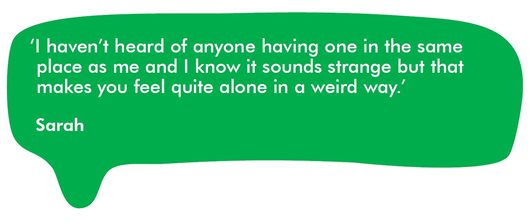This week is Sarcoma Awareness Week. Sarcomas are rare cancers that start in the soft, connective tissues of the body or in the bones. In this blog, written by editor Sadie, we explain more about sarcomas and look at their symptoms and risk factors. We also tell you where you can find more information about sarcomas and get support.
What are sarcomas?
Sarcomas are cancers that develop in the supporting tissues of the body. There are two main types: soft tissue sarcomas and bone sarcomas. Soft tissues include fat, muscle, nerves, fibrous tissues and blood vessels. These two types of sarcoma grow and develop differently and are treated differently from each other.
Sarcomas are rare. About 3,300 people a year in the UK are diagnosed with soft tissue sarcomas. About 500 people a year are diagnosed with bone sarcomas.
Sarcomas can develop in almost any part of the body, but most commonly affect the arms and legs.
There are many different types of sarcoma. These include:
There are also other types of very rare sarcoma. We have more information about types of soft tissue sarcoma and types of bone cancer on our website.
In the below video, Shelbee talks about her experience of being diagnosed with Ewing’s sarcoma:
What are the symptoms of a sarcoma?
Sarcomas often don’t cause symptoms for a long time. The symptoms will depend on the part of the body that is affected.
If there is a soft tissue sarcoma in an arm or a leg, the most common symptom is an uncomfortable swelling in the limb. This swelling is sometimes painful or tender, but it may also be painless. If the sarcoma is in the central part of the body (the trunk), the symptoms will depend on which of the body’s organs is affected. Usually, soft tissue sarcomas don’t cause any symptoms until they are quite large and pressing on an organ, nerve or muscle. Symptoms include a lump that:
Symptoms of a bone sarcoma can include:
If you are worried about any symptoms you have, see your GP. Remember, though, that these symptoms can also be caused by other conditions.
What are the risk factors for sarcoma?
The exact causes of sarcomas are unknown, but there are some things that are thought to increase the risk of them developing.
The risk factors for soft tissue sarcomas include:
The risk factors for bone sarcomas include:
There is no evidence that an injury can cause a sarcoma to develop. It is possible that an injury may draw attention to a sarcoma that was already there and not causing any symptoms, but the sarcoma will have taken many years to develop.
Where can I get more information and support?
We have booklets called Understanding soft tissue sarcomas and Understanding primary bone cancer. They have detailed information about sarcomas, their diagnosis and treatment, and ways to cope. These booklets are available in print, PDF and eBook formats.
We also have information on soft tissue sarcomas and bone sarcomas on our website.
You may have many different feelings after being diagnosed with cancer. This is natural. But having a rare cancer can bring extra challenges, such as greater uncertainty and isolation. Our cancer support specialists can help – you can speak to them by calling 0808 808 00 00. Macmillan can offer a range of emotional, practical and financial support.

There are also other organisations that can offer information and support to people affected by sarcoma. These include:
To see what else Macmillan's cancer information team has been blogging about, please visit our blog home page! You can subscribe to receive our blogs by email or RSS too.
We're with you every step of the way
The Macmillan team is here to help. Our cancer support specialists can answer your questions, offer support, or simply listen if you need a chat. Call us free on 0808 808 00 00.
Comments? Feel free to add them below (you need to be logged in).
Keep in touch Follow Macmillan’s cancer information team on Twitter @mac_cancerinfo
Whatever cancer throws your way, we’re right there with you.
We’re here to provide physical, financial and emotional support.
© Macmillan Cancer Support 2024 © Macmillan Cancer Support, registered charity in England and Wales (261017), Scotland (SC039907) and the Isle of Man (604). Also operating in Northern Ireland. A company limited by guarantee, registered in England and Wales company number 2400969. Isle of Man company number 4694F. Registered office: 3rd Floor, Bronze Building, The Forge, 105 Sumner Street, London, SE1 9HZ. VAT no: 668265007